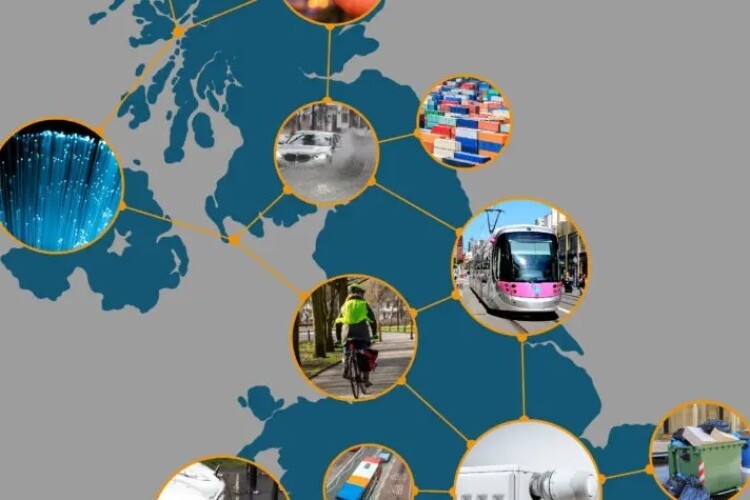The UK’s independent advisers on infrastructure say that progress towards major infrastructure objectives in the past year have “stutter[ed] further just as the need for acceleration has heightened”.
The National Infrastructure Commission (NIC) says that “in a range of areas government is off track to meet its targets and ambitions”.
The NIC’s annual Infrastructure Progress Review highlights progress towards nationwide coverage of gigabit broadband by 2030 and continued growth in renewable electricity, both of which it notes have enjoyed a relatively stable policy environment. However, it criticises “negligible advances in improving the energy efficiency of UK homes, the installation of low carbon heating solutions or securing a sustainable balance of water supply and demand,” which have been subject to a more short term and changeable approach in recent years.
The report points out that government has set an ambition for at least 600,000 heat pumps to be installed each year by 2028, while only 55,000 were fitted in 2021 – meanwhile, 1.5 million gas boilers were fitted. Similarly, government expects 300,000 public electric vehicle charge points to be in place by 2030; but only 37,000 public charge points are currently installed.
The Commission also calls for a “greater sense of certainty” around progressing HS2 and Northern Powerhouse Rail, stressing that delays inevitably push back the economic benefits for communities.
In its proposals for “getting back on track”, the Commission calls for:

- Policy staying power to deliver long term goals and reduce the uncertainty that adds cost for business and delays or deters investment;
- Fewer, but bigger and better interventions from central government, with tighter strategic focus on the areas it can make the most difference rather than “expending too much effort on many small scale funding interventions and repeated consultations, trying to maintain optionality in all areas”;
- Greater devolution of funding and decision making, moving away from competitive bidding processes and building on the multi year funding settlements for combined authorities with long term devolved budgets for all local transport authorities, while also allowing greater revenue raising powers at a local level;
- Unblocking delivery barriers, specifically the planning regime for nationally significant infrastructure projects, where updated National Policy Statements for key sectors are the first big step.
The report identifies ten specific priorities for the year ahead, including an acceleration of home energy efficiency improvements – including tightening minimum standards in private rented sector homes – and faster roll out of electric vehicle public charge points. The commission also highlights the need for government to finalise proposals on water efficiency labelling and new building regulations within the year to help achieve the 110 litres per day consumption target by 2050.
The commission will publish a review on how to accelerate the planning system for major infrastructure projects later this spring. This will be followed in the autumn by the second National Infrastructure Assessment, setting out costed recommendations on infrastructure priorities for the next 30 years.
Responding to the report, Chris Richards, director of policy at the Institution of Civil Engineers said: “Last year when the NIC issued its progress report the Institution of Civil Engineers observed that the lack of progress toward meeting long term net-zero and levelling up objectives was ‘concerning’. This year, the lack of progress can best be described as ‘alarming’.
"The need for action to meet the challenge of climate change has never been clearer, and we seem to be going backwards.
“One bright spot of the report is that in areas where clear policy frameworks exist, such as renewable electricity deployment and devolving power to metro mayors, progress has been made.
“Given the alarming nature of the NIC's report, the ICE recommends the Treasury select committee hold a one-off evidence session so that ministers can respond to the warnings and recommendations made by the NIC on the record. The government needs to establish clear policy frameworks for other areas to get us back on track, we can’t waste any more time.”
Got a story? Email news@theconstructionindex.co.uk



